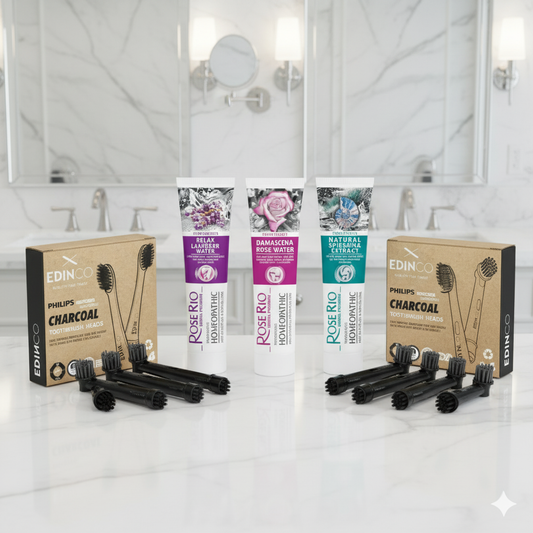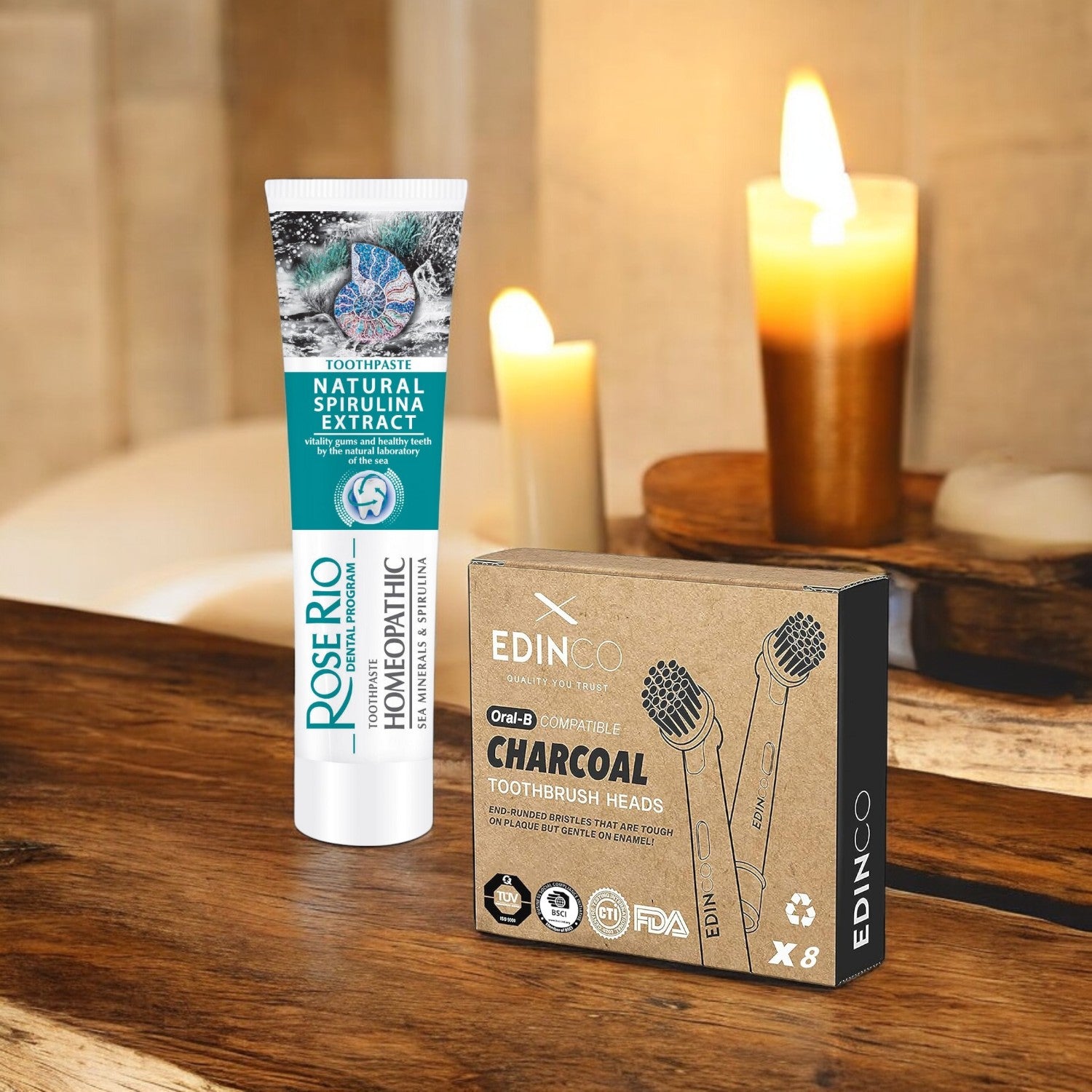What Is Hydroxyapatite Toothpaste and Is It a Safe Whitening Alternative?
Table of Contents
Introduction: Discover a Natural Path to a Brighter Smile
Hydroxyapatite, a mineral naturally found in tooth enamel, is gaining attention as a safe whitening alternative, with research from Scientific Reports (2019) showing it matches fluoride’s remineralization potential. This guide explores whether this natural option can revolutionize your oral care, offering a gentler path to a brighter smile. The rise of sustainable oral care in 2025 has spotlighted innovators like Edinco, a British company founded in August 2019 by UK dental and engineering experts. While Edinco does not produce hydroxyapatite toothpaste, it leads with fluoride and fluoride-free toothpastes featuring sea minerals and spirulina, alongside recyclable charcoal toothbrush heads, supporting zero-waste goals and charities for medical care, education, and food access.
Explore our oral care range, featuring natural ingredients like Sea Minerals, Spirulina, and organic botanicals → Shop Now at Edinco
What Is Hydroxyapatite and How Is it Going to Help Your Teeth?
Does your body contain Hydroxyapatite?
Hydroxyapatite (HAp) is a calcium phosphate mineral naturally present in tooth enamel and dentin, forming a bio-identical component of teeth. It supports enamel repair by depositing nanocrystals into micro-cracks, enhancing resistance to acid erosion, as noted in Frontiers in Oral Health.
What Is the Repair and Protection of Enamels by Hydroxyapatite?
HAp repairs enamel by laying nanocrystals into the micro-cracks creating a protection against erosion by acid. It has been shown to aid in the strength and resilience of the enamels. (Frontiers in Oral Health).
What’s the Difference Between Nano-Hydroxyapatite and Micro-Hydroxyapatite?
Nano-hydroxyapatite (nHA) with particles (1-100 nanometers) penetrates enamel deeply for repair, while micro-hydroxyapatite coats the surface. nHA excels in whitening and remineralisation, as noted in the International Journal of Nanomedicine.
Can Hydroxyapatite Replace Fluoride in Oral Care?
Yes, studies indicate nHA matches fluoride’s remineralisation efficacy, with a 2019 trial showing equal cavity prevention (Scientific Reports).
Compare Hydroxyapatite To Traditional Whitening Toothpastes?
Why Do Regular Whitening Toothpastes Tend to Be Too Abrasive?
Traditional whitening toothpastes tend to employ abrasive substances such as hydrated silica which is capable of wearing away enamel with time hence users are forced to search at the milder ones. The hydroxyapatite whitens, filling enamel pores with reflective crystals, being a non-damaging alternative, has clinical evidence in NCBI.
Does Hydroxyapatite Whitens Teeth and Does Not Destroy the Enamel?
Yes, nHA whitens teeth by sealing enamel pores with crystals, which reflect light, and makes them whiter, with continued usage without wearing out, according to clinical evidence (NCBI).
What Clinical Studies Support Hydroxyapatite Whitening?
A PubMed study confirmed nHA whitening after 4-6 weeks, making it a promising xylitol toothpaste UK ally.
Can Hydroxyapatite Be Used Every Day on Sensitive Teeth?
Yes, it is biocompatible and it renders it less sensitive, hence Many find it safe and giving a calming effect to the sensitive teeth, which makes it easy to use as a stable oral care choice.
What Does Science Reveal about the Safety and Efficacy of Hydroxyapatite?
What Do the Peer-Reviewed Studies Tell Us about HAp-enamel remineralisation?
The literature evidence on oral health suggests that nHA can remineralize in early caries, and it can support an enamel repair process, and the same list of advantages can be attributed to conventional fluoride-based approaches.
Is Hydroxyapatite considered to be safe by Dental and Health Authorities?
The peer-reviewed articles such as PubMed testify to the capacity of hydroxyapatite to remineralize early caries, which is comparable to the benefits of fluoride. It is regarded as safe and non-hazardous with no major toxicity and presents an alternative to fluoride-free to those who want to use natural products.
How Does Hydroxyapatite Perform for High-Risk Groups Like Children?
nHA is safe and has no side effects in clinical trials in children above three years of age, and in pregnant women, although dental counseling is advisable.
Is Hydroxyapatite Equivalent to Fluoride in the Reduction of Plaque and Cavities?
There is evidence that nHA can reduce plaque and aid in cavity protection providing a natural alternative to fluoride. This makes it a reliable brand when it comes to sustainable toothpaste.
Learn more in The Case of Why We Don’t Use Fluoride: A Look at Safe, Sustainable Oral Care.
Who needs to apply Hydroxyapatite Toothpaste?
Can Hydroxyapatite be used with Sensitive Teeth or Gum Recession?
Hydroxyapatite suits those with sensitive teeth or gum recession due to its remineralizing properties. It’s also vegan-friendly when synthetically derived and safe for children over three with dental supervision.
Can Vegans and Those Avoiding Animal Products Use It?
Yes, Edinco’s synthetic HAp is vegan and cruelty-free, aligning with natural toothpaste UK ethics.
Is Hydroxyapatite Whitening Safe for Children and Teenagers?
Safe for ages 3+, nHA supports developing teeth without fluoride risks, with parental oversight advised.
Does the Type of HAp (Nano vs. Micro) Impact Its Effectiveness?
nHA is optimal for whitening and deep repair, while micro-HAp suits surface protection, Edinco chooses nHA for superior results.
Not sure which formulation fits your needs? View our product guide—specially designed for conscious UK professionals. → Learn More
What Makes a High-Quality Hydroxyapatite Toothpaste Stand Out?
Why Do We Offer Both Fluoride and Fluoride-Free Options?
This allows our customers to choose the best formula for their personal oral care philosophy. Our fluoride-free products use Xylitol and Sea Minerals to naturally protect and enhance teeth, and our fluoride products offer the proven anti-cavity protections of the recommended, safe, and controlled doses of fluoride.
What Are Ingredient Synergies, such as Xylitol and Essential Oils?
Xylitol assists in reducing bacteria that cause plaque and other components like Certified Organic Lavender Water are calming and Certified Organic Rose Water is soothing to the sensitive gums. Our toothpaste Sea Minerals contains spirulina, a single source of nutrients, antioxidant and anti-inflammatory.
What is the effect of texture and consistency on Whitening performance?
Toothpaste containing hydroxyapatite is of high quality with additives such as xylitol to control plaque and other oils that are crucial in calming down the mouth. There is a non-abrasive texture that is smooth and guarantees even distribution, but ISO 9001 and cruelty-free certifications confirm the statements.
How Can You Verify a Brand’s Hydroxyapatite Claims?
Request ISO 9001, cruelty-free, and lab reports and Edinco provides transparency on third-party testing.
Why Opt for a Natural, Recyclable Hydroxyapatite Toothpaste?
How Does Plastic Toothpaste Packaging Contribute to Oral Care Waste?
According to waste audits, packaging of toothpaste consists of plastic which leads to a high amount of waste in the oral care sector with millions of non-recyclable tubes being thrown away in the UK every year. The use of recyclable alternatives helps a cyclical economy and helps to minimize the influence of landfills.
What Makes Edinco’s Packaging Truly Recyclable and Zero-Waste?
Edinco’s Kraft paper tubes with soy-based inks are fully recyclable via UK bins, cutting landfill impact.
How Does Choosing Hydroxyapatite Toothpaste Support the Circular Economy?
Edinco’s products and Recycling Reward Scheme promote reuse, reducing waste and enhancing sustainable oral care.
How Does Hydroxyapatite Enhance a Conscious Oral Health Routine?
Is It Worth Flossing and Oil Pulling On Hydroxyapatite Toothpaste?
Yes, flossing cleanses, and oil pulling using coconut oil is an addition to HAp that makes the oral care process holistic and sustainable.
Hydroxyapatite to facilitate the process of recovery following the cosmetic dental procedures?
Yes, it is used to heal post-whitening or bonding sensitivity, and dentists suggest nHA in 2-4 weeks.
How Often do you brush on Hydroxyapatite Toothpaste?
Remineralisation is maximised by twice per day using two minutes on a soft-bristled recyclable packaging toothbrush UK.
Which Toothbrush is the most effective with Remineralising Pastes?
The toothpaste can be used in conjunction with flossing and oil pulling to make a holistic routine with pair hydroxyapatite toothpaste. It helps recover sensitivity of the post-procedure, and remineralization is optimized by brushing with a soft-bristled toothbrush twice a day.
Point to compatible recyclable charcoal toothbrush heads from Edinco
Does Hydroxyapatite Toothpaste really provide real whitening results?
What Do User Reviews and Testimonials Feedback about Hydroxyapatite?
According to clinical studies, whitening is seen to be noticeable after 4-6 weeks with maximum benefits being seen after 8-12 weeks. Users describe the clean feeling as soft, non-gritty, which is unlike abrasive pastes.
How Soon Can You Expect to See Whitening Results?
According to clinical data, visible whitening begins at 4-6 weeks, and complete benefits in terms of remineralisation after 8-12 weeks.
Are There Before-and-After Images or Case Studies Proving Effectiveness?
Edinco shares case studies on its site, showing measurable enamel repair and whitening, validated by UK dentists.
What Makes Hydroxyapatite Whitening Feel Different?
Users describe a gentle, non-gritty clean, contrasting with abrasive pastes, enhancing natural toothpaste UK appeal.
Ready to try an enamel-safe whitening solution that works? Shop our sustainable toothpaste range today → Edinco’s Natural-Toothpastes
How Is Edinco Supporting Safer Smiles and a Healthier Planet?
Why Did Edinco Choose Hydroxyapatite for Its Formulas?
Sustainably oral care with fluoride and fluoride-free toothpastes and charcoal toothbrush heads that can be recycled, Edinco is a company created by dental experts based in the UK in 2019. Part of the proceeds is used in supporting charity of clean water and community welfare whereas local production minimizes carbon footprints.
How Does Every Purchase Contribute to Charitable Partnerships?
A part of the proceeds is used to sponsor charitable events aimed at clean water, children and community nutrition. The purchase of this natural toothpaste by the UK consumers helps in causes that enhance health and education, and this common cause is similar to that of the eco-conscious consumers.
What Impact Has Edinco’s Community-Driven Approach Achieved?
Our Recycle Reward Scheme encourages our customers to recycle used tubes through our Reward Scheme, which reduces the amount of plastic waste. The used products are reused in communal activities and our program helps in developing sustainable oral care practices. We are all trying to minimize the world problem of waste of toothpaste tubes.
How Does Local UK Production Lower Your Carbon Footprint?
British company production helps minimize shipping distances compared to global supply chains, reducing the environmental footprint. Local and EU sourcing supports recyclable packaging goals while ensuring faster delivery. This commitment to British quality aligns with the values of eco-conscious consumers.
Conclusion: Make Brighter Choices for Health and Planet
Hydroxyapatite toothpaste offers a safer whitening option, benefiting enamel and the planet with recyclable packaging. Edinco complements this with sustainable oral care solutions. Make the switch for a healthier smile and eco-conscious future.
Seen enough? Make the switch to naturally effective oral care—with the UK's science-led eco-brand. → View Our Toothpastes
FAQs
1. Does hydroxyapatite toothpaste actually whiten teeth?
Yes, hydroxyapatite toothpaste can help whiten teeth naturally. It works by filling tiny enamel imperfections, creating a smoother surface that reflects more light and appears whiter. While it doesn’t bleach teeth like peroxide-based formulas, it provides gentle and safe whitening over time.
2. What are the disadvantages of hydroxyapatite toothpaste?
Hydroxyapatite toothpaste is generally safe, but its whitening effect may be slower compared to chemical whiteners. It can also be slightly more expensive than traditional toothpaste due to its advanced formulation. However, it remains an excellent choice for people with sensitive teeth or those avoiding fluoride.
3. Why was hydroxyapatite banned?
Hydroxyapatite itself was never banned. Confusion often arises because certain forms of nano-hydroxyapatite required regulatory review in some countries before approval. Today, it’s considered safe for oral care when used in toothpaste that meets proper safety and purity standards.
4. What is the safest whitening toothpaste to use?
The safest whitening toothpaste is one that whitens gently without damaging enamel — such as hydroxyapatite toothpaste. It strengthens teeth while brightening them naturally, making it a preferred choice for people with sensitive gums or enamel erosion.
5. Is hydroxyapatite toothpaste better than fluoride?
Both have benefits. Fluoride helps prevent cavities by making enamel more resistant to decay, while hydroxyapatite rebuilds and remineralizes enamel directly. Many dentists view hydroxyapatite as an effective, biocompatible alternative for those avoiding fluoride.
6. Is hydroxyapatite toothpaste safe?
Yes, hydroxyapatite toothpaste is clinically proven to be safe and biocompatible. It’s even used in medical and dental applications like bone repair, proving its gentle yet effective nature for daily oral care.


